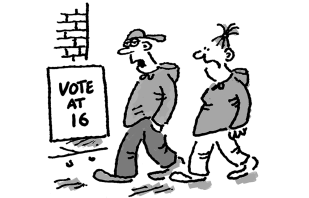During the 1983 general election, I campaigned every single day with great zeal and avidity. I knocked on quite literally thousands of doors enquiring of people if we, the Labour party, could count on their support on 9 June. I would start at 9 o’clock and finish 12 hours later, taking a break at about 7 p.m. because interrupting Coronation Street was considered a vote loser.
The closest the party has to a geographical base are the poorer parts of our eastern seaboard
I did all this with my hair spiked up in jagged tufts held in place by gallons of hairspray, and with a little bit of eyeliner and maybe a streak of blusher on my cheeks. My favoured shirt was fluorescent blue stripes on a pale blue background. My jeans were ripped at both knees. A pair of ragged Converse baseball boots and two badges – one promoting the Campaign for Nuclear Disarmament and the other pledging my affection for a band called Cabaret Voltaire – completed my outfit.
I reckon I must have singlehandedly lost my party a good 5,000 votes. Cardiff West – Labour in every election before 1983 and indeed in every election since – fell to the Tories in the shape of the ‘eccentric’, not to mention borderline deranged, Stefan Terlezki. These days I like to imagine what the predominantly working-class voters thought when they opened their front doors to me. ‘Vote Labour and make absolute tossers like this happy’ is the obvious answer.
It was a depressing campaign for me, as well as for Michael Foot, of course. I remember only one moment with fondness. Towards the end of the fourth week of campaigning, I had been sent to a very affluent area of the city. I was absolutely knackered, desperate for a pint, and the last house on my list was the grandest of them all. A beautiful detached Edwardian villa with three cars on the gravel drive. It was a very long gravel drive and I thought to myself, what’s the point? What’s the actual point? There is no way these morons are Labour voters.
But still, I crunched across the gravel, banged on the door and asked the very well-to-do chap who answered if we could count on his vote. ‘I’m afraid not,’ he replied. ‘You see, there isn’t a parliamentary road to socialism. We need revolution.’ That, at least, had me cackling to myself for a few hours.
For reasons which will remain forever mysterious, some 8,456,934 people were persuaded to vote Labour in that election, giving the party 27.6 per cent of the vote and a total of 209 seats. The newly formed SDP/Liberal Alliance were but inches behind them, with 7,780,949 voters and 25.4 per cent of the vote. They managed to secure just 23 seats, however, despite having almost doubled their vote from 1979.
Why am I bothering you with this arcane electoral history? Because it strikes me that Reform may be in a similar situation to the one in which the Alliance found itself 41 years ago – and the problem with Reform, in our electoral system, is the same one which bedevilled the Alliance: the absence of a true geographical heartland.
Back then, the Liberals could count on the West Country, a few affluent city suburbs and one or two seats in the old nonconformist Yorkshire and Lancashire mill towns. The SDP brought to the party an extra three million or so votes – but they were catastrophically dispersed, as well as being divided between moderates who had despaired of the Labour party and traditional Tories still pining for Rab Butler. The result was 23 seats, the majority of them in Liberal strongholds.
It is surely likewise with Reform. The closest the party has to a genuine geographical base are the poorer parts of our eastern seaboard, from Thanet to Ashington, taking in the Thames estuary towns (such as Clacton, wisely snaffled up by Nigel Farage) and areas adjacent to the east coast which have had large amounts of immigration imposed upon them, such as Boston in Lincolnshire. But it is not really a geographical stronghold per se even here – not in the same way that the rural shires are a Tory stronghold, for example. For a while Ukip and the Brexit party might have pointed to those Red Wall seats as a kind of embryonic stronghold, but not now, I don’t think – and even in 2019 they did not actually take a single seat.

My suspicion is that while the Reform vote may indeed continue to climb and climb, despite the fury and odium poured upon Farage and the party by the Conservative-supporting press, to have a presence in parliament its opinion poll standing would need to be more than double the current 18 per cent or so – and even then they still wouldn’t get many seats.
I say all this not to denigrate Reform at all, nor to deter people from voting for the party. Both Richard Tice and Nigel Farage have done an extraordinary job from not far short of a standing start, whatever you may think of their policies. It is simply about the chronic unfairness of our electoral system – one which can reward the Scottish National party with 48 seats when it achieves less than 4 per cent of the vote, but would likely give Reform no seats at all for winning 18 per cent of the vote. That, I would suggest, is an absurdity.
As a member of the SDP, I sometimes become impatient with the insouciance of the party at failing to break through, despite having policies with which a good half of the population are in full accord. ‘It will take time,’ I’m assured – and it is a geographical base which is needed. We’ve begun that in Leeds (quite impressively) and South Yorkshire, but there is, er, a certain distance still to be travelled. That democratic revolution we saw in mainland Europe cannot, de facto, be replicated here, even if – as I suspect – a majority of voters would welcome it.







Comments